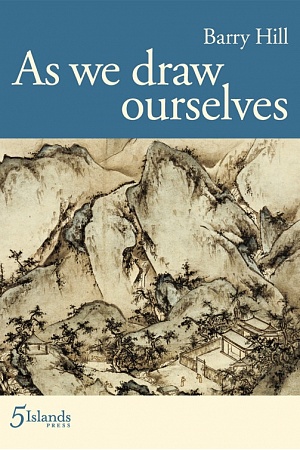Crete
Hyland House, $19.95 pb, 114 pp,
Crete by Dorothy Porter
‘Byron!’, said Max Beerbohm ‘– he would be all forgotten today if he had lived to be a florid old gentleman with iron-grey whiskers, writing very long, very able letters to The Times about the Repeal of the Com Laws.’ As we know, things turned out otherwise, and Byron lives on, in the hallowed phrase, as flash as a rat with a gold tooth.
Dorothy Porter’s Crete would be a natural home for such ironies, in that it constantly turns the givens of the literary past to new purposes – usually in the twinkling of a tongue, often at the tilting of a heart. Her Byron, or Tsvetaeva, or Mandelstam is nobody else’s, but here they all are, attended by Porterian flourish.
What is she up to in Crete? Readers of her earlier work will not be surprised to learn that the enterprise negotiates (at least) two zones of being. One is that of physical intimacy – not only that between one embodied self and another, but the jumpy electric charge between the I who knows and the known I. The other is that of blazoned imaginations – in this case, for instance, Arthur Evans’ rendition of archaic Crete, or George Seferis’s psychic hinterland, or George Steiner’s.
Something a little like this happens in all poetry. Unless something called to be fleshed out, nothing would be written; at the same time, we all borrowed the alphabet and its sleeping messages from other people. In Porter’s case, though, the transaction is intensified. It is as if she is being romanced, night and day, by word as by world.
The resulting thrill often takes the form of a question, with which many of the dozens of poems here begin. ‘What do the Minoans teach us – / exuberance with bloody hands?’: ‘Is the gaily painted trussed bull / still alive / as its slashed neck bleeds / into the sacred vessel?’: ‘Is poetry a strange leftover / of Minoan bull-leaping?’: ‘Am I the Arthur Evans / of my own lost city?’: ‘Is my blood too thin / to serve the gods of ecstasy?’ Such interrogations face outwards towards the palpable with all its vivid names, and inwards towards the revolved, customarily impassioned, self.
The easiest thing to say about still romantic poetry is that it resumes the argument between love and death, but that does not make it the less true, and it is certainly apropos in Crete. ‘The Labyrinth of Intimacy ‘, after an epigraph from Steiner referring to the ‘absolutely alien which we come up against in the labyrinth of intimacy’, goes,
How far did the Minoan thread go
in the labyrinth of intimacy?
Was there less tear and tangle
when they loved their dead
more than each other?
The world of gorgeous hallucination
is a sweeter place to visit
than the mucky lair of another’s heart.
The Minotaur helpless
the Minotaur bleating
blind in the brutal sun
is this the truth of love
none of us could bear?
If the poet nothing affirmeth, and therefore never lieth, such accumulated questioning will still lead us to go one way or the other: a yes or a no germinates in the mind, and possibly in the heart. But part of Dorothy Porter’s success as these poems unfold is in her appropriating that immensely durable imaginative resource, the labyrinth, which by design goes on giving and taking, leading out and leading in, and making play both with pattern and with chaos. Many of the poems in the long ‘Crete’ sequence – like others in other sections of the book – are homages to passion, as suggested by titles like ‘Wild Honey’, ‘The Law of Volcanoes’, ‘Why I Love Your Body’, ‘My at-last-lover’: many of the same poems are also investigations – deployed probes, testings of the angles and surfaces of experience’s labyrinthine ways.
Improbably, as some will think, but not in vain, the book includes a sequence which is in effect a celebration of the cigarette, that sixth finger in so many millions of hands. The first part goes,
The dove of peace
no Longer brings
an olive branch
the dove of peace
offers the halo
of the shared cigarette
that glow
between your lover’s fingers is the red-tipped palm
on your oasis
it smoke-signals
your shared
alert drowse
you have never heard
the war so hushed.
If still-life were a vital artistic genre today, the cigarette would have a good claim to a place in it: it is not surprising after all that it can also belong in a book so exercised by love’s subjection to, and defiance of, mortality.
Since the fire never says,’ Enough’ and desire is in principle infinite in pitch, the open-mouthed voracity of question can always claim a place where love is at issue – another reason for its prominence in this book. But question’s near relation, fancy, is also accommodated generously. One of the most attractive and illuminating, poems here is ‘Liberties’, with its Wildean epigraph, ‘The secret of life is Art’:
The Minoans took greater liberties
with nature
than squinting Arthur ever took
with them
blue birds, flowering ivy,
wild roses with an impossible
number of petals
a reckless geyser
blooming over polished agate
they painted what they fancied
not what they saw.
Myth is a way of taking liberties with history, history a way of taking liberties with myth; Wilde’s aestheticism may be shaky when taken to extremes, but at least it can alert us to paradoxes innate in most ways of registering experience. Dorothy Porter’s ‘they painted what they fancied / not what they saw’ seems to me to catch much more than a central element in her own poetry. The very old argument about whether we are moved principally by knowledge or principally by desire is not likely to be decided in any one generation, which means that the ways of ‘fancy’ are likely to remain the paths of poetry. In ‘Vanished’, Porter writes of ‘An extravagant boy / deified by extravagant art / deaf to personal questions.’ Her own art manages to make the extravagant and the personal neighbours.











Leave a comment
If you are an ABR subscriber, you will need to sign in to post a comment.
If you have forgotten your sign in details, or if you receive an error message when trying to submit your comment, please email your comment (and the name of the article to which it relates) to ABR Comments. We will review your comment and, subject to approval, we will post it under your name.
Please note that all comments must be approved by ABR and comply with our Terms & Conditions.